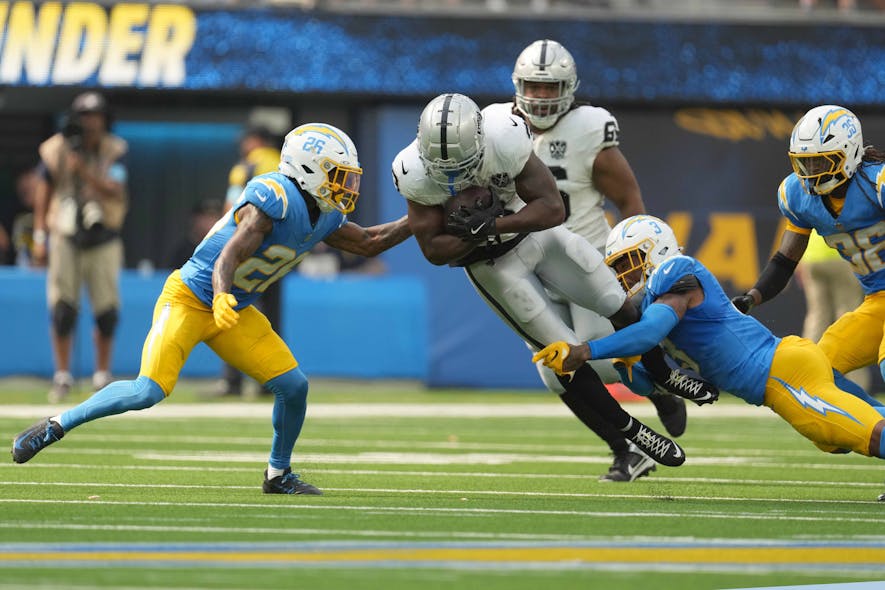Go here for this week's Passing Matchups.
Top 5 Rushing Matchups
Chicago at Indianapolis
The Chicago Bears' rushing offense has been a major disappointment through the first two games of the season, with offseason acquisition D'Andre Swift struggling significantly. Swift is averaging just 2.0 yards per carry and has managed only 24 rushing yards per game. However, it's important to consider the challenging schedule the Bears have faced, going up against two of the NFL's premier run-stopping units in Tennessee and Houston. Despite this, the Bears' offensive line, particularly at the tackle positions with Braxton Jones and Darnell Wright, has failed to provide the necessary support, which is problematic since Swift is most effective on off-tackle runs. Compounding the issues, the Bears have also been dealing with instability along the offensive line. In Week 1, they rotated players at the right guard position, but with Ryan Bates now on injured reserve, they have committed to Nate Davis. Despite being one of the team's highest-paid players at $10 million per year, Davis has struggled both on and off the field, frequently missing practices and drawing criticism from local media as a player lacking commitment.
The Indianapolis Colts have been highly vulnerable against the run this season. Both Josh Jacobs and Joe Mixon have exploited this weakness, each topping 150 rushing yards in their respective matchups against the Colts. Opposing teams have heavily committed to the run against Indianapolis, with the Texans and Packers averaging 38 rushing attempts per game. The root of the Colts' problems lies in their beleaguered front seven, which has been hampered by injuries to key players like DeForest Buckner on the defensive line and Samson Ebukam at linebacker. As a result, players like Raekwon Davis, Zaire Franklin, and rookie Jaylin Carlies have been thrust into roles that exceed their current capabilities, leading to frequent breakdowns in run defense. Although Grover Stewart remains a reliable presence at defensive tackle, the Colts need more consistent contributions from the rest of the unit. Notably, safety Nick Cross leads the team in tackles with 29—a concerning sign that too many running plays are breaking through to the secondary.
Las Vegas vs Carolina
The Las Vegas Raiders' rushing offense has struggled significantly through the first two games of the season, averaging just 49 yards per game, the worst mark in the NFL and 19 yards fewer than the next closest team. Last week, despite being competitive against Baltimore, the Raiders largely abandoned the run, attempting just 15 carries as they leaned on Gardner Minshew II's arm in a pass-heavy game plan that ultimately secured their victory. Zamir White appears to have gained favor with the coaching staff, seeing his snap share increase from 38% in Week 1 to 63% in Week 2, while Alexander Mattison's snap share declined from 60% to just 22%. The Raiders' offensive line remains unsettled, particularly at left guard, where Cody Whitehair and Andrus Peat split snaps without either securing the position. There's growing speculation that rookie Jackson Powers-Johnson, a second-round pick who has yet to see the field, could get a look at the position as the team continues to search for answers up front.
The Raiders' matchup against the Carolina Panthers offers a prime opportunity to get the ground game going, as Carolina's run defense has been one of the weakest in the league. Through two games, the Panthers have allowed an average of 167 rushing yards per game, including a 131-yard performance by JK Dobbins last week. This poor run defense is a product of a perfect storm: Carolina's offense has been nearly non-existent, scoring just 6.5 points per game, which has forced the defense onto the field for extended periods and allowed opponents to exploit their run defense. Carolina's struggles have been compounded by a lack of talent on the defensive line and at linebacker. The departure of Frankie Luvu this offseason left a significant void that the team has been unable to fill effectively. Replacement Josey Jewell has been a liability at linebacker, struggling to shed blocks and making it difficult for the defense to stop the run, especially with star defensive tackle Derrick Brown sidelined for the season. If the Panthers' offense can improve, potentially under veteran quarterback Andy Dalton, it might relieve some of the pressure on their defense. However, if their offensive woes continue, expect opposing teams to keep pounding the ball against this defense, with 30 or more rushing attempts per game becoming the norm. For the Raiders, this matchup could be a much-needed opportunity to establish their run game and build some offensive balance moving forward.

